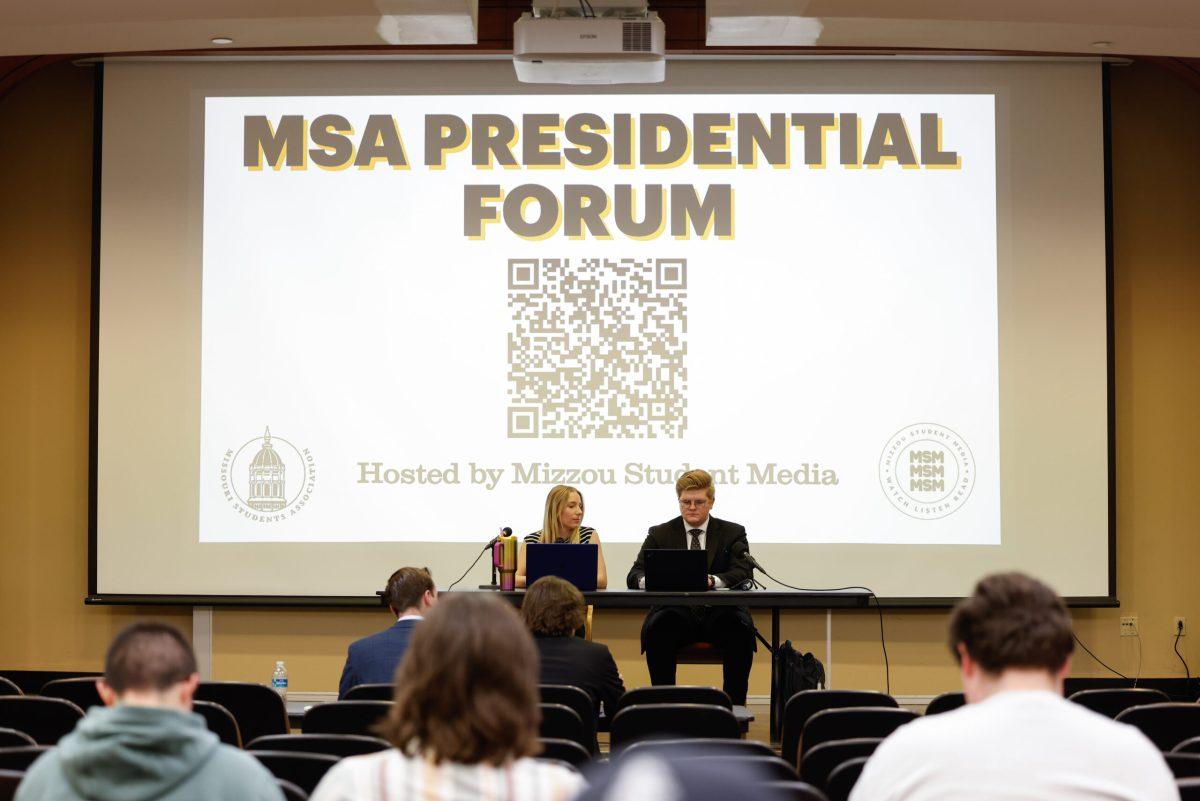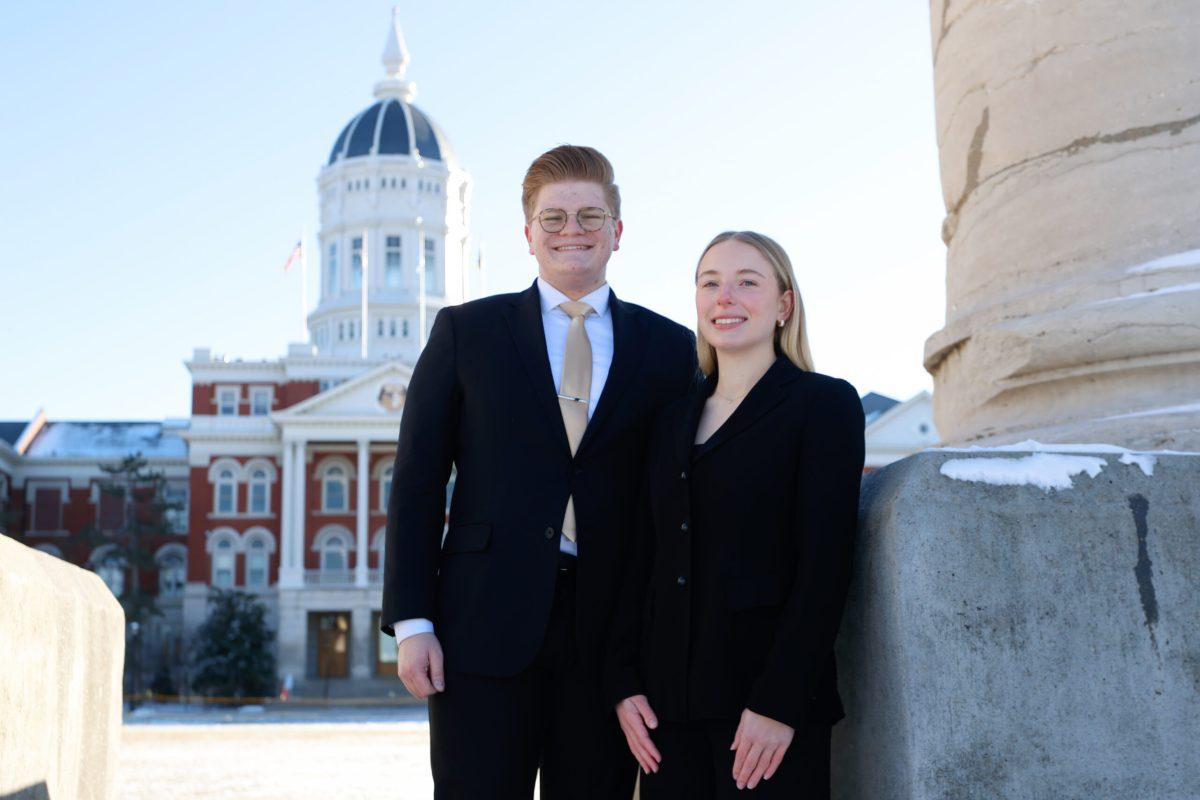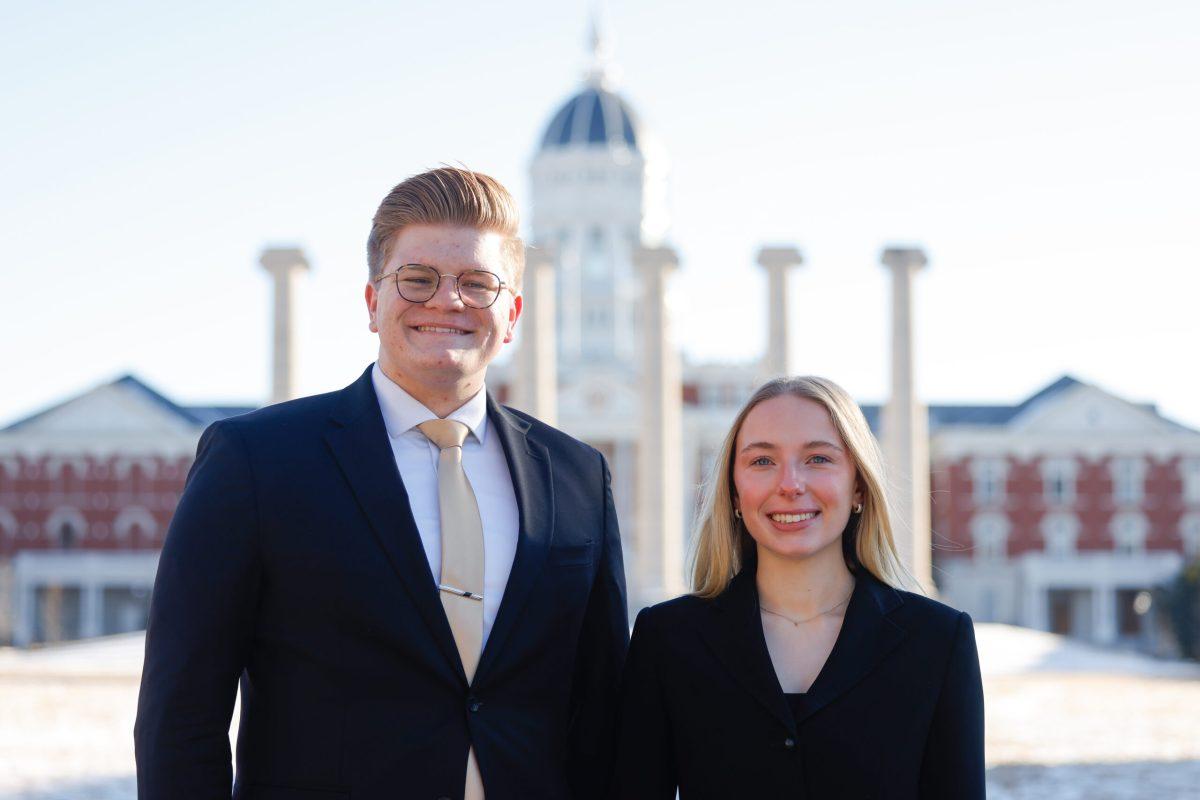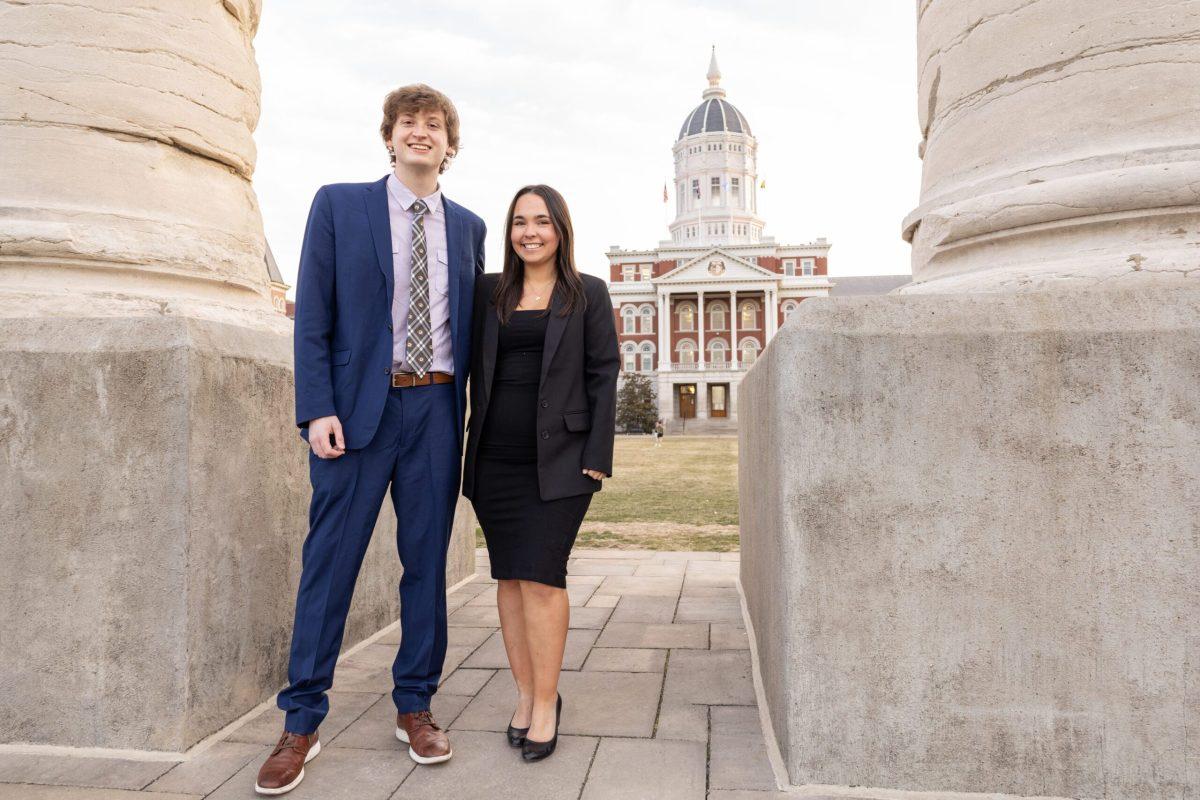Renew Mizzou and Ready to Roar, the two slates vying for Missouri Students Association president and vice president, met at 7 p.m. Sunday for a Zoom debate before the election starts Monday.
MU juniors Landon Brickey and Emily Smith are the presidential and vice presidential candidates for Renew Mizzou, and juniors Will Shafer and Key Avingston-Banks represent the Ready to Roar slate. Maneater Editor-In-Chief Caitlin Danborn and Student Politics Editor Joy Mazur hosted the debate, which began with opening statements from both slates before moving on to questions, summaries of each platform and closing statements.
Both slates introduced themselves and their goals, beginning with Renew Mizzou. Brickey and Smith both discussed their previous leadership roles. Brickey is the current director of Caring for Columbia, and he also served as the MSA Senate Operations Chair. Smith said she served as MU’s Delta Gamma chapter president and is on Tour Team. They said Renew Mizzou’s platform emphasizes equity and inclusion, as well as the communication among students and administration on a variety of issues that affect students at MU.
“An objective we have for these positions would be to create a streamlined communication effort, so that no person or organization on this campus feels that they have not been heard or included,” Smith said.
Shafer and Avingston-Banks also discussed the leadership positions each of them has held. Shafer is the president of the Kappa Alpha Order and chaired a nonprofit called Pitch in for Patriots to benefit veterans in his hometown. Avingston-Banks currently serves as executive treasurer for MSA and was executive chief of staff to a previous campaign. He is also vice president of the Black Pre-Law Students Association. Shafer said they will rely on “servant leadership” to advance students’ interests.
“We believe Mizzou needs bold leaders who are willing to do the right thing and willing to lobby for students, and that’s why Key and I are running,” Shafer said. “We are those bold leaders who are willing to do the right thing.”
After opening statements, the slates answered 12 questions, some from the moderators and some from the audience. One topic that appeared throughout the debate was the COVID-19 pandemic and its effects on students and their learning.
The moderators asked each slate about their stances on reopening in-person classes versus continuing hybrid learning for next school year. Brickey said Renew Mizzou’s goal is to be the voice for the student body, and that the platform wants to make sure all students feel safe on campus and rely on public health officials for guidance.
Avingston-Banks said he and Shafer will push the university to offer whichever mode of classes the student body supports. He added that if the university wants to return to in-person classes, it needs to ensure enough students are vaccinated.
“We’ve heard from students, and students have said if you haven’t put in the work that’s required to do this safely, we don’t want it,” Avingston-Banks said.
Smith said the COVID-19 vaccine should be accessible to all students. A potential plan Smith discussed includes using STRIPES to drive students to get vaccinated if they do not have access to cars or public transportation.
The virus poses a danger to students’ physical health, Shafer said, but it brings with it a “silent pandemic” endangering students’ mental health. He pointed to a few aspects of Ready to Roar’s platform, such as a fall break, improved access to mental health resources and a COVID-safe return to intramurals, as ways to alleviate students’ mental burden.
Brickey said COVID-19 poses many issues for students, such as mental health issues as well as xenophobia toward Asian students. He said that though intramural sports are important to some parts of the student body, Renew Mizzou wants to “focus on projects that help the student body.” Brickey said there are more important issues to tackle than intramurals.
Both platforms also addressed sexual assault education and prevention.
MU currently requires students to complete virtual sexual assault training before they begin their first semester. Brickey said students simply click through the course without absorbing the information. He said Renew Mizzou wants to work with the administration and the Relationship and Sexual Violence Prevention Center to create a mandatory first-year course on sexual assault “to ensure that RSVP education is implemented.”
Avingston-Banks said the problem with MU’s current sexual assault education initiatives is that they are not student-centered. He said he and Shafer want to personalize these programs with student input by creating an interactive program for all students similar to Citizenship@Mizzou.
Shafer and Avingston-Banks also said they want to develop and distribute kits students can use to test drinks for date-rape drugs. Shafer said the test kits are a useful initiative but also a “Band-Aid on a larger problem.” Avingston-Banks agreed, but he added that the drink kits will be an effective secondary measure to education and will provide critical data giving insight into date rape and sexual assault at MU.
“We can be completely, 100% honest, education doesn’t always work,” Avingston-Banks said. “This gives us a failsafe. This gives us a Plan B to help keep Tigers safe, and I think that’s incredibly important.”
Smith said the RSVP Center told Renew Mizzou that the drink tests will not help them and they will “never have these in their centers,” as the test kits could endanger students. She said students who are already in a dangerous situation could further endanger themselves by revealing to their attacker that they know their drink is spiked. If a student is not in a dangerous situation, she said the test could upset whoever the student is with and thus create a dangerous situation.
The moderators also asked each platform how they plan to address the concerns of students of color, LGBT students and students with disabilities.
Shafer and Avingston-Banks said they will emphasize inclusiveness on campus by encouraging students to contact organizations like the LGBTQ Resource Center and Women’s Center when they need help.
He also said they will collaborate with campus organizations and resource centers and ask what they want. Shafer said Ready to Roar has already done this with the Mizzou Disability Coalition. He said the Coalition told him last week they were not on the President’s Council, and he said he reached out to Vice Chancellor Bill Stackman on their behalf.
“I think it’s important for us to expand the table, bring more people and give them a seat,” Shafer said. “That’s how we can tackle these issues, bringing together people from all different sorts of perspectives.”
Shafer said he and Avingston-Banks also want to establish a program at MU that would give students with intellectual disabilities extra educational and vocational opportunities. Other nearby universities, including the University of Tennessee and the University of Central Missouri, already have such programs.
Brickey said MU’s leadership and administration failed to respond to the need for diversity and inclusion on its campus. He said that the importance of diversity and inclusion are woven into the multiple goals and missions of Renew Mizzou’s platform.
“We want to make sure that we’re funding scholarships for activists, we want to make sure we’re removing any hindrances to student success,” Brickey said.
Smith said MU is “not a fully accessible campus,” and Renew Mizzou will ensure that the conversations with administration will continue.
Brickey added that organizations like the LGBTQ Resource Center should always be at the table for major debates, even if the debate at hand is not directly related to LGBT issues. He said he is a member of the LGBT community himself and wants to hear from members of the community with different experiences to guide him and Smith forward.
One issue both campaigns tied to inclusiveness was the Thomas Jefferson statue on Francis Quadrangle. Some students have called for MU to remove the statue since Jefferson owned slaves and have organized protests, such as last semester’s Mizzou 600 protest in Jesse Hall.
Renew Mizzou aims to take the Thomas Jefferson statue down as part of their mission to foster diversity on campus. Brickey emphasized that the Jefferson statue creates a hindrance and upsets students of color.
“[The Jefferson statue] does affect [students of color] mentally every single day,” Brickey said. “Every time they have to walk past the quad, they have to deal with the mental trauma of reminding them that Mizzou … is built on racist foundations and a system of racism.”
Avingston-Banks is Black, and he said he agrees that the statue, placed “front and center” on the quad, puts a “huge mental hold” on MU’s students of color. He said UM System President and MU Chancellor Mun Choi and the Board of Curators have been clear that they will not remove the statue. He said Ready to Roar will not advocate to remove the statue because it would be unrealistic to do so.
After questions, each slate summarized its platform and gave its closing statement.
Shafer and Avingston-Banks said their goal is to center MU around its “core values” of respect, responsibility, discovery and excellence. Shafer said Ready to Roar wants to make MU “a better place than they found it” by ensuring student success, bringing people together and making MSA a place that is free, fair and equitable.
“In the next coming days, you’re gonna have a choice, a choice between the status quo or a choice between bold new leaders who are willing to do the right thing,” Shafer said. “You have a stark contrast between us [and Renew Mizzou], and I’ll ask you to side with us.”
Smith said Renew Mizzou’s main goals include fostering diversity and inclusion and to streamline communications between the student body and administration in order to “create a culture of care.”
“We can’t wait to be your next MSA president and vice president,” Brickey said. “We think you should vote for us because we put our money where our mouths are. We constantly take action to make sure that our campus is more diverse and more inclusive and more equitable. So let’s get ready to renew the Zou.”
All undergraduate students can vote for MSA president and vice president at vote.missouri.edu. Voting will open at 6 p.m. Monday and close at 6 p.m. Wednesday. Students interested in speaking to the slates can reach Brickey and Smith at @renewmizzou2021 on Instagram, @renewmizzou on Twitter and via email at [email protected]. They can reach Shafer and Avingston-Banks at @readytoroarmiz on Instagram and Twitter and via email at [email protected].
_Edited by Joy Mazur | [email protected]_













